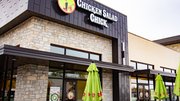Article
The age of the grounded consumer
As they blend a decent price point with an enjoyable atmosphere, fast casual restaurants are poised to reach a more scrutinizing consumer.

March 11, 2010
Many business owners, especially those in the retail and restaurant sectors, were happy to bid farewell to 2009 -- a year defined by high unemployment rates, decreased consumer spending and myriad financial uncertainties. The onset of 2010 brought hope and perhaps a proverbial light at the end of the tunnel. While the end of the recession may be in sight, our culture is undoubtedly forever changed due to this economic crisis. Some believe that as the economy continues to improve consumers will return to their old spendthrift ways, forgetting the lessons learned during these difficult economic times, but I strongly disagree. I believe a permanent cultural shift has occurred as a result of the downturn and a new "grounded consumer" has emerged. My company, Context-Based Research Group, is a consumer anthropology firm with cultural anthropologists around the world who observe human behavior. We conducted two studies during the Great Recession to uncover insights into the changes in consumer behavior. The first study, "Grounding the American Dream," used ethnographic research to identify a five-stage process people were undergoing at the close of 2008 and through 2009: Stage 1: Goodbye Homo economicus "I no longer want to be defined by what I buy." Stage 2: My Life is Not a Loan "I cut back my credit and started to save." Stage 3: From a Me to a We Economy "Transacting life is not as valuable as building relationships." Stage 4: unSTUFFing Our Lives "I'm getting rid of value-less things and surrounding myself with people and things that matter." Stage 5: The Grounded Consumer "Now I'm more strategic and smarter – connecting my emotional, rational and social senses to how I live and consume." Our latest study, "Coming of Age in the Great Recession," validates findings and predictions from the original research by using a quantitative approach. It also provides updated and more detailed insight into post-recession attitudes and behaviors. One of the most attention-grabbing findings from the recent research is that 78 percent of survey participants agreed the American Dream has died. Once synonymous with home ownership and a better, richer, happier life, the new American Dream is now being defined by ideals rather than material possessions.
We're moving into an era during which we measure the quality of our lives in social terms before economic ones. As an anthropologist, I define this as a shift from a "me" to a "we" economy.
According to our research, 43 percent of Americans believe the recession has positively affected their lives. People are emerging from the worst economic climate in recent history more joyous and ready to live a more meaningful life.
Restaurant experiences that deliver this joy – a blend of good price, positive space for connecting, good food, service, will do best.
Marketing tactics and sales incentives from the previous decade will no longer resonate with this new consumer. People are scrutinizing every purchase they make and they're seeking more significant and joyful experiences when they do spend money.
Fast casual restaurants are currently in an excellent position, as they blend a decent price point with an enjoyable atmosphere. Consumers feel comfortable hanging out in these establishments; fast food restaurants are not built for lingering or relaxing.
In today's economic environment, businesses must create portals to joy, environments for their patrons to experience this newly found joy.
Fast casual restaurants are typically very welcoming, from the warm-hued walls to the plush sofas, comfortable chairs, and WiFi, thus creating an ambiance, something consumers can anticipate, look forward to and relish – without feeling they have overindulged or overspent.
When going out to eat, it's not just about the food – consumers want to have a positive, joyful experience, something fast casual chains do well. For example, Panera Bread now provides their customers with a unique plate as opposed to their oversized tray, something which was better suited for a cafeteria or fast food restaurant. This tray-less approach allows customers to have space at their table; to enjoy their meal and their company without feeling cramped.
It is important for consumers to feel they are getting more than a transaction and fast casual restaurants are offering a social, happy setting. Consumers also aren't emphasizing "fancy" right now and they aren't identifying themselves with high-end purchases. Fast casual restaurants are meeting consumer demand by providing a quality experience that is very balanced in terms of spending.
Grounded consumers are interested in enriching their lives and not merely acquiring more "stuff." This is not to say that we've suddenly become an austere society. We will still spend, but spending will be more calculated than it was prior to the recession.
From our research we found that virtually all Americans (93 percent) have become more strategic in their spending habits, evaluating how purchases fit into their lives rather than purely seeking instant gratification. So as we emerge from the Great Recession, it's important for retailers to pay close attention the behaviors of the new grounded consumer. Understanding this ever-evolving group can help retailers of all shapes and sizes navigate this new terrain. * Dr. Robbie Blinkoff is the founder and principal anthropologist at Context-Based Research Group, and chief anthropologist at Carton Donofrio Partners, in Baltimore.
 ChatGPT
ChatGPT Grok
Grok Perplexity
Perplexity Claude
Claude












